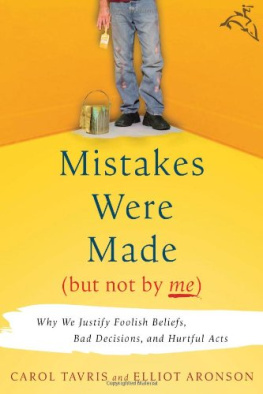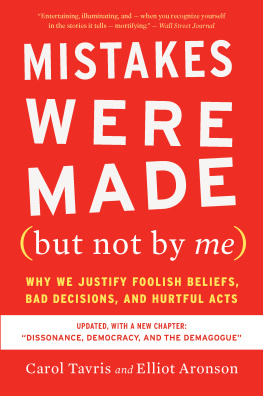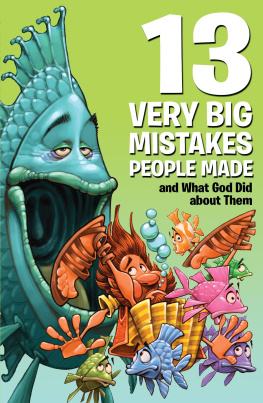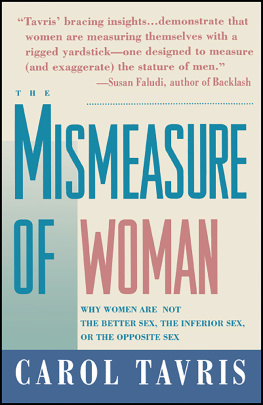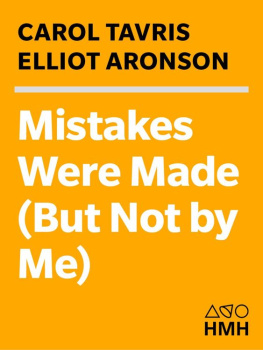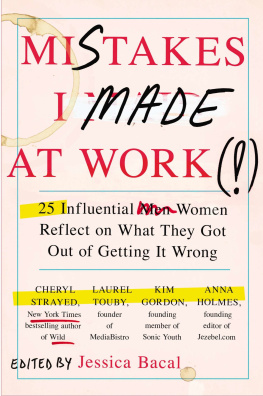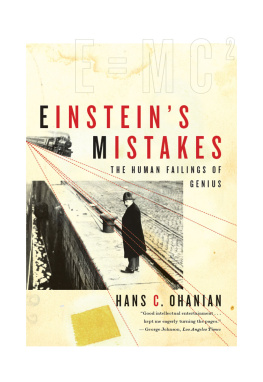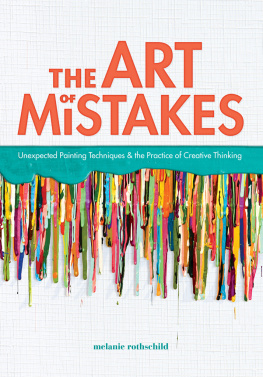Afterword
We decided the order of authorship of this book by flipping a coin; it's that balanced a collaboration. However, from start to finish, each of us has firmly believed that he or she was working with the more talented coauthor. So, to begin with, we want to thank each other for making this project one of mutual encouragement and learningand fun.
Our book has benefited from careful, critical readings by colleagues who are specialists in the areas of memory, law, couples therapy, business, and clinical research and practice. We would especially like to thank the following colleagues for their close evaluation of chapters in their fields of expertise, and for the many excellent suggestions they gave us: Andrew Christensen, Deborah Davis, Gerald Davison, Maryanne Garry, Bruce Hay, Brad Heil, Richard Leo, Scott Lilienfeld, Elizabeth Loftus, Andrew McClurg, Devon Polachek, Leonore Tiefer, and Donald Saposnek. In addition, we appreciate the comments, ideas, stories, research, and other information offered by J. J. Cohn, Joseph de Rivera, Ralph Haber, Robert Kardon, Saul Kassin, Burt Nanus, Debra Poole, Anthony Pratkanis, Holly Stocking, and Michael Zagor. Our thanks also to Deborah Cady and Caryl McColly for their editorial help.
Our courtly agent and good friend Bob Lescher has been right there for us and with us from the first glimmer of a book proposal to the book's launch into the world. Bob's love of a good contract nearly matches his love of a good sentence, and we are grateful for his help with both. Moreover, Bob found our commissioning editor, Jane Isay, who has been a joy to work with. Jane has the grace, skill, and humor needed to let writers know what is wrong with their first drafts in a way that inspires us to reviseand revise, and revisealways bolstering our morale and helping us improve our prose. She is that rarity, a hands-on editor, and her stories and ideas infuse this book. We also thank our talented and supportive editor at Harcourt, Jenna Johnson, who shepherded our book from completion through production and beyond. Finally, we would like to thank managing editor David Hough, a man who loves everything about books (including authors), for making the production phase remarkably painless and educational, and Margaret Jones, for her exceptional skill in copyediting and fact checking.
Most of all, we give our thanks and love to our spouses, Ronan O'Casey and Vera Aronson. Mistakes were made by us in our lives, but not in our choice of a life partner.
Carol Tavris and Elliot Aronson
Endnotes
Long before we became writers, we were readers. As readers, we often found notes an unwelcome intrusion in the flow of the story. It was usually a pain in the neck to be forever turning to the back of the book to learn what the author's source was for some persuasive (or preposterous) idea or research finding, but every so often there was candya personal comment, an interesting digression, a good story. We enjoyed assembling these notes, using the opportunity to reference and sometimes expand the points we make in the chapters. And there's some candy in here, too.
INTRODUCTION
Knaves, Fools, Villains, and Hypocrites:
How Do They Live with Themselves?
1 "Spy Agencies Say Iraq War Worsens Terrorism Threat," The New York Times, September 24, 2006; the comment to conservative columnists was reported by one of them, Max Boot, in "No Room for Doubt in the Oval Office," the Los Angeles Times op-ed, September 20, 2006. For a detailed accounting of George Bush's claims to the public regarding the war in Iraq, see Frank Rich (2006), The Greatest Story Ever Sold: The Decline and Fall of Truth from 9/11 to Katrina. New York: The Penguin Press. On May 25, 2006, with his ratings below 30 percent, Bush finally admitted that he had been wrong about something, sort of. Not about the war or any of the decisions related to it, but about his choice of words. When he used "tough talk" such as "bring it on" and "wanted, dead or alive," Bush said, "I think in certain parts of the world it was misinterpreted." In October 2006, shortly before the midterm elections, the White House announced Bush would no longer be using his familiar "stay the course" line because it implied the administration was not "flexible" about Iraq policy. Nonetheless, in a press conference on October 25, with violence in Iraq at record highs, Bush said there would be no major changes in his overall strategy and that he was committed to "getting the job done." When asked whether the United States was winning the war, he said, "Absolutely, we're winning."
2 The American Presidency Project (online), www.presidency.ucsb.edu/ws/ index.php, provides documented examples of every instance of "mistakes were made" said by American presidents. It's a long list. Bill Clinton said that "mistakes were made" in the pursuit of Democratic campaign contributions, and later joked about the popularity of this phrase and its passive voice at a White House Press Correspondents dinner. Of all the presidents, Richard Nixon and Ronald Reagan used the phrase most, the former to minimize the illegal actions of the Watergate scandal, the latter to minimize the illegal actions of the Iran-Contra scandal. See also Charles Baxter's eloquent essay, "Dysfunctional Narratives: or: 'Mistakes were made,'" in Baxter (1997), Burning Down the House: Essays on Fiction. Saint Paul, MN: Graywolf Press.
3 Gordon Marino (2004, February 20), "Before Teaching Ethics, Stop Kidding Yourself," in The Chronicle of Higher Education, p. B5.
4 On the self-serving bias in memory (and the housework study in particular), see Michael Ross and Fiore Sicoly (1979), "Egocentric Biases in Availability and Attribution," Journal of Personality and Social Psychology, 37, pp. 322336. See also Suzanne C. Thompson and Harold H. Kelley (1981), "Judgments of Responsibility for Activities in Close Relationships," Journal of Personality and Social Psychology, 41, pp. 469477.
5 John Dean, interviewed for Playboy by Barbara Cady, January 1975, pp. 6580. Quote is on p. 78.
6 Robert A. Caro (2002), Master of the Senate: The Years of Lyndon Johnson. New York: Knopf, p. 886.
7 Katherine S. Mangan (2005, April 1), "A Brush With a New Life," The Chronicle of Higher Education, pp. A28A30.
8 See, for example, Sherwin Nuland (2003), The Doctors' Plague: Germs, Childbed Fever, and the Strange Story of Ignac Semmelweiss. New York: Norton/Atlas.
9 Ferdinand Lundberg and Marynia F. Farnham (1947), Modern Woman: The Lost Sex. New York: Harper and Brothers, p. 11 (first quote), p. 120 (second quote).
10 Edward Humes (1999), Mean Justice. New York: Pocket Books.
CHAPTER 1
Cognitive Dissonance: The Engine of Self-justification
1 Press releases from Neal Chase, representing the religious group Baha'is Under the Provisions of the Covenant, in "The End Is Nearish," Harper's, February 1995, pp. 22, 24.
2 Leon Festinger, Henry W. Riecken, and Stanley Schachter (1956), When Prophecy Fails. Minneapolis: University of Minnesota Press.
3 Leon Festinger (1957), A Theory of Cognitive Dissonance. Stanford: Stanford University Press. See also Leon Festinger and Elliot Aronson (1960), "Arousal and Reduction of Dissonance in Social Contexts," in D. Cartwright and Z. Zander (eds.), Group Dynamics (third ed.), New York: Harper & Row, 19601; and Eddie Harmon-Jones and Judson Mills (eds.) (1999), Cognitive Dissonance: Progress on a Pivotal Theory in Social Psychology, Washington, DC: American Psychological Association.
4 Elliot Aronson and Judson Mills (1959), "The Effect of Severity of Initiation on Liking for a Group,"
Next page
